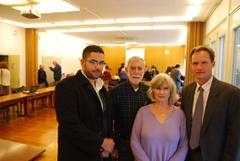Palestinian and Jewish activists call to work for peace

“It's time for Palestinians and Israelis to share a just peace” – is the message of the World Week for Peace in Palestine and Israel. Participants at the roundtable on “occupation and dispossession” (from left to right): Hazem Jamjoum, Nathan and Caroline Finkelstein, and Rev. John Calhoun, convener of the Week.
The plight of Palestinians living under Israeli occupation and the need to hold the Israeli State accountable under international law were highlighted at a roundtable hosted by the Palestine Israel Ecumenical Forum in Geneva, Switzerland on 31 May. The roundtable was one of the events marking the World Week for Peace in Palestine Israel.
“After 62 years [in which Palestinians have suffered] continued dispossession, forced displacement, apartheid, occupation and colonization, we just want people to begin to say: the State of Israel is not special, it is not above international law”, said Hazem Jamjoum, a Palestinian activist.
Why can Israel get away with committing murder, as it did this morning?”, asked Jamjoum, who is communications officer of the BADIL Resource Centre for Palestinian Residency and Refugee Rights. He was referring to the attack carried out earlier that day by the Israeli military against a convoy of vessels bringing humanitarian aid to the Gaza Strip. During the attack up to 10 peace activists were killed and many more injured.
Jamjoum was speaking at a round table on “occupation and dispossession” organized as a part of the World Week for Peace in Palestine Israel, celebrated between 29 May and 4 June 2010. The week has been convened by the World Council of Churches in cooperation with ecumenical partners and encourages Christians and churches across the world to pray and work for a just peace in Palestine and Israel.
For Jamjoum, the only reason the State of Israel can continue carrying out its policies against the Palestinian people is “because the international community is doing nothing about it”. So he called on the audience to “think how you and your organizations, whether they are state-related or not, can engage in a campaign to hold Israel accountable”.
Participating at the roundtable together with Jamjoum were Caroline and Nathan Finkelstein, two Geneva-based Jewish activists who are members of Urgence Palestine and of the International Jewish Anti-Zionist Network.
“The military occupation strongly influences the life and working conditions of people living under it”, said Nathan Finkelstein. He listed poor salaries, child labour, lack of social benefits and absence of legal rights amongst the consequences of the occupation on Palestinian workers.
“The occupation is simply strangling the Palestinian economy”, Nathan Finkelstein added.
In turn, Caroline Finkelstein spoke about the constant harassment inflicted by Israeli settlers on Palestinian villagers in the occupied territories. For example, she said, in the valley of Wadi Qana, between the cities of Nablous and Qalquiya, a few Palestinian families live surrounded by nine Israeli settlements, considered illegal under international law.“
Those Palestinian families are not allowed to build houses, they have no electricity, cannot dig wells for water, but they are determined to remain in their land”, Caroline Finkelstein said. “These are wonderful people, with so much courage, they will re-plant whatever the settlers destroy.”
In the Jordan Valley, which represents one quarter of the West Bank, “out of 350,000 Palestinians who lived there before 1968, today there are only 5,500 left”, said Caroline Finkelstein. Meanwhile, the valley has been colonized by 36 illegal settlements.
For Jamjoum, Israeli policies aim at the “forced displacement of the largest indigenous population” with the goal to gain “control of a maximum of Palestinian land with a minimum of Palestinian population”.
A list of events taking place during the World Week for Peace in Palestine Israel shows how churches from the Philippines to the United States and from the Netherlands to Kenya are engaged in related activities.
The Palestine Israel Ecumenical Forum is a platform that rallies churches together enabling them to coordinate their efforts and initiatives for a just peace in Palestine and Israel.
Website of the World Week for Peace in Palestine Israel
More on the World Week for Peace in Palestine Israel



